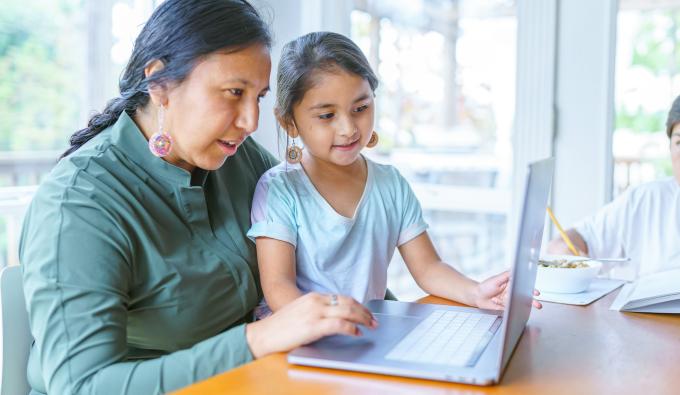DCYF is tracking federal actions that may affect programs serving Minnesota children and families. Get verified facts, current status, and how services continue.
Cohort 2: The Whole Family Approach

In 2019, three divisions, Economic Assistance and Employment Supports, Child Care Services and Child Safety and Permanency, in the Children and Family Services Administration of the Department of Human Services, combined funding to offer grants to a second cohort of seven local organizations. This second cohort was named the Whole Family Systems Initiative.
Whole Family Systems Initiative brings together and expands upon the work and lessons of the 2-Gen Policy Network (cohort 1), the Child Care Services Division’s Early Childhood Systems Reform project and the Child Safety and Permanency Division's work to bring equitable outcomes in child welfare.
City of Saint Paul
The City of Saint Paul is investing in its children by starting a college savings account with $50 for each child who lives in Saint Paul, born in 2020 and after. While the city is saving for children’s futures through CollegeBound Saint Paul, with it's partners it is working to address the financial insecurity that impacts many Saint Paul families. Financial insecurity is a whole family systems problem – when families are not financially secure it directly affects both the adults and the children in the household.
The City of Saint Paul is using its Whole Family Systems Initiative grant to develop CollegeBound Saint Paul into a platform to improve the financial health, early childhood development and health outcomes of Saint Paul families with infants and toddlers with a deeper equity focus on Black, Indigenous, Latino and Asian families in Saint Paul.
Comunidades Latinas Unidas En Servicio (CLUES)
CLUES (Spanish for Latino Communities United in Service) is Minnesota’s largest Latino-led nonprofit organization, founded in 1981 by and for Latinos to provide culturally and linguistically relevant services. Its mission is to advance social and economic equity and well-being for Latinos by building upon strengths and cultures, uplifting the community, and activating leadership for systemic change.
CLUES will support children aged 0 to 5 in Latino families by addressing disparities in language and literacy skills and engaging the whole family in services to enhance their well-being. CLUES will partner with Latino parents and community partners to create community-based solutions and implement recommendations to best meet their holistic needs.
Fond du Lac Tribal College - Ojibwemotaadidaa Omaa Gidakiiminaang (OOG)
Fond du Lac Tribal and Community College has a unique mission of providing education to the public through a close partnership between a Tribal Nation and the State of Minnesota. This unique collaboration offers all students, regardless of demographic background, the opportunity to learn in a comfortable and diverse environment.
The Fond du Lac Tribal College’s language immersion program is partnering with Child Care Aware and Fond du Lac Social Services to establish “Grandma’s House.” This service as a language nest where young children, with the help of their parents, elders and language staff, will grow up immersed in Ojibwe language and culture in a rich, home-like environment to convey a sense of identity, responsibility and spiritual relationship to all creation.
Intercultural Mutual Assistance Association
Intercultural Mutual Assistance Association fosters the well-being and independence of refugees and immigrants who resettle in Rochester and the surrounding area.
Intercultural Mutual Assistance Association and Families First of Minnesota are leading a multi-disciplinary team to partner with families and community agencies to explore the social-cultural barriers to success in pre-kindergarten to kindergarten-age children whose families are first-generation immigrants and refugees.
Minneapolis American Indian Center
The Minneapolis American Indian Center is a community center in the heart of the American Indian community of Minneapolis. It is one of the oldest Indian centers in the country, founded in 1975. It provides educational and social services to more than 10,000 community members annually. Its goal is to preserve and support American Indian cultural traditions through art, youth and inter-generational programs.
Minneapolis American Indian Center and it's Bright Beginnings program will develop family and systems-level solutions to barriers faced by American Indian women who have experienced substance abuse, and have a history with or are at risk of involvement with the child welfare system. The goal is to help these women develop a stable, safe and nurturing environment for their children. The project will incorporate cultural education and seek out additional cultural resources for its work with families.
Northpoint Health and Wellness Center Inc.
NorthPoint Health & Wellness Center is a multi-specialty medical, dental and mental health center and human service agency in North Minneapolis. Many children and their families experience challenges to healthy development with fewer protective factors to mediate those risks due to structural racism, historical trauma, poverty and other factors.
Northpoint’s Whole Family Systems Initiative prototype focuses on providing culturally responsive perinatal care to African American birthing persons in Minneapolis. The target population is African American birthing persons enrolled in a Medical Assistance or MinnesotaCare plan and residing in zip codes of 55411 and 55412 (North Minneapolis, Brooklyn Center and Brooklyn Park).
The goal of the Whole Family Systems Initiative at NorthPoint is to improve maternal health, reduce parental stress and support family well-being.
People Serving People
People Serving People is the largest and most comprehensive emergency shelter for families experiencing homelessness in Minnesota and a dedicated leader in homelessness prevention.
People Serving People is partnering with Mill City Kids and the Hennepin County Office to End Homelessness to explore issues related to child care access, quality early childhood education and ways to prevent recurring family homelessness. Family homelessness overwhelmingly impacts African American and American Indian communities.